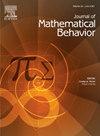Mathematizing the world: A routine to advance mathematizing in the elementary classroom
IF 1.7
Q3 EDUCATION & EDUCATIONAL RESEARCH
引用次数: 0
Abstract
The Mathematizing-the-World routine (MWR) is an efficient culturally responsive instructional routine for mathematizing that explicitly supports problem posing using an image or object. Given the under-representation of problem-posing studies in elementary school settings, our qualitative study analyzed student responses from 56 MWR enactments in grade 3–5 classrooms in two regions of the United States. Our findings include detailed examples of the MWR in action, including how three open-ended prompts engaged younger students in mathematizing and posing problems related to authentic, real-world situations. We summarize findings across the 56 MWR classroom enactments focusing on the understandings about the context and the mathematical ideas evidenced in student responses. Our findings demonstrate the potential of the MWR as a catalyst for eliciting and communicating diverse student ideas while engaged in the problem-posing process. We discuss research and practice implications for this routine to support mathematizing, and specifically problem posing in the elementary classroom.
世界数学化:在小学课堂上推进数学化的常规方法
世界数学化例行程序(MWR)是一种高效的文化响应式数学化教学例行程序,它明确支持利用图像或物体提出问题。鉴于问题摆放研究在小学环境中的代表性不足,我们的定性研究分析了美国两个地区 3-5 年级课堂中 56 个 MWR 案例中学生的反应。我们的研究结果包括 MWR 在行动中的详细实例,包括三个开放式提示如何让低年级学生参与数学化,并提出与真实世界情境相关的问题。我们总结了 56 个 MWR 课堂实践的发现,重点是学生回答中体现的对情境和数学思想的理解。我们的研究结果表明,在提出问题的过程中,MWR 有助于激发和交流学生的不同想法。我们讨论了这一常规的研究和实践意义,以支持数学化,特别是小学课堂中的问题提出。
本文章由计算机程序翻译,如有差异,请以英文原文为准。
求助全文
约1分钟内获得全文
求助全文
来源期刊

Journal of Mathematical Behavior
EDUCATION & EDUCATIONAL RESEARCH-
CiteScore
2.70
自引率
17.60%
发文量
69
期刊介绍:
The Journal of Mathematical Behavior solicits original research on the learning and teaching of mathematics. We are interested especially in basic research, research that aims to clarify, in detail and depth, how mathematical ideas develop in learners. Over three decades, our experience confirms a founding premise of this journal: that mathematical thinking, hence mathematics learning as a social enterprise, is special. It is special because mathematics is special, both logically and psychologically. Logically, through the way that mathematical ideas and methods have been built, refined and organized for centuries across a range of cultures; and psychologically, through the variety of ways people today, in many walks of life, make sense of mathematics, develop it, make it their own.
 求助内容:
求助内容: 应助结果提醒方式:
应助结果提醒方式:


